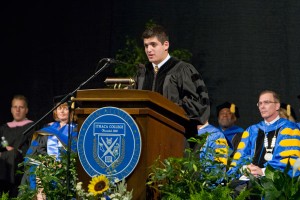Throughout his life, much has been asked of Scott Nachlis.

On campus, the senior applied psychology major serves as the president of the Student
Government Association in a time when administrators, faculty members and students are finalizing and preparing IC 20/20, Ithaca
College’s vision plan for the next decade, for implementation.
Such a task would be a difficult undertaking for many, but
Nachlis is no stranger to responsibility. Back home in Kingston, Pa., about 15 minutes outside Scranton, Nachlis had no choice but to grow up quickly. His father, Steven Nachlis, said he has struggled with the blood-clotting chronic pain condition anticardiolipid syndrome, meaning his blood can clot at any given moment.
Nachlis called an ambulance for his father at the age of eight, according to Steven, and sometimes even had to give his father shots. His father’s medical problems reached a point where Nachlis said he “knew the hospital like the back of [his] hand.”
Nachlis’ father walks with a cane and doesn’t always have a lot of energy. But to Nachlis, he’s a best friend and a motivator.
“He serves as a huge inspiration to me,” Nachlis said. “If I complain about writing a paper, I just think he’s dealing with physical pain day after day — what he goes through every day and how optimistic he is.”
In November 2010, Steven underwent heart surgery, and,
regardless of what was happening on campus, he said he never doubted that his son would be there with him in the operating room — just like any other time.
“Scott is tremendous by my side,” Steven said. “He’s one I can always depend upon, rely upon.”
It’s this unselfish, others-first attitude that, according to SGA adviser Sarah Schupp, has allowed Nachlis to excel as leader of the student body.
“During your senior year, you’re supposed to be self-absorbed because it’s your last time in college and your last time you can leave your mark somewhere,” Schupp said. “But I really think that he thought about others during his senior year.”
Nachlis has presided over SGA in a year when, in addition to soliciting student feedback and working with the administration on facets of IC 20/20, the body has created an international student senator position, endorsed an Asian-American studies program and a hydraulic fracturing ban on campus, grown the off-
campus medical amnesty policy and established a new bill system within SGA.
“In terms of personality, if I see something that I think should be changed, I’ll go out and do it,” Nachlis said. “I’m not the type of person to necessarily be shy.”
But Nachlis has not always been this outgoing — he said he didn’t have the courage to run for SGA his freshman year. His sophomore year, he served as a class of 2012 senator, and the following year, he occupied the position now referred to as vice president of Senate affairs.
Nachlis also formed the Constructionists to run for the SGA e-board about a year ago with the simple goal of “construct[ing] a better IC.” When asked why he ran for the presidency, he acknowledged a cliché in citing Mohandas Gandhi’s famous quote, “Be the change you wish to see in the world,” garnering a laugh from junior Rob Flaherty, SGA’s vice president of communications, who’d heard the answer before.
All joking aside, despite all the changes, Nachlis said the accomplishment he’s most proud of within SGA may not be felt until after he’s left — that he believes he’s better positioned student government moving forward. It’s a skill that Flaherty attributes to Nachlis’ “big picture” and “long-term” thinking.
Nachlis’ involvement with the Office of Student Engagement and Multicultural Affairs through SGA and as an orientation leader and student leadership consultant even led him to change his career plans. He originally planned to enter the field of sports psychology but now seeks to enter higher education, specifically student affairs. Here, Nachlis said, he can use the leadership, motivation and team-building elements he’s learned in his psychology classes and applied through SGA.
Despite a long list of responsibilities, his friends, family members and co-workers are quick to point out Nachlis’ sense of humor, which they say draws others in.
“Even if we’ll be having a very heated, intense discussion about a policy issue on campus, five minutes later, he’ll be joking or laughing about something else,” Flaherty said. “He’s very good at keeping his work life and his life life separate.”




